![[EAI · The Genron NPO Press Conference] The 4th Korean-Japanese Mutual Cognition Poll Announcement](../images/bg_tmp.jpg)
[EAI · The Genron NPO Press Conference] The 4th Korean-Japanese Mutual Cognition Poll Announcement
Korea-Japan(East Asia) Public Opinion Survey | Events | 2016-07-20
Program
|
Opening Remarks |
Sook-Jong Lee, President of EAI
|
|
Presentation: Introduction of 2016 Poll Results |
Bomi Kim, Senior Research Fellow of EAI
|
|
Q&A |
Sook-Jong Lee, President of EAI
|
|
Close
|
Introducing EAI·Genron NPO "the 4th Korea-Japan Joint Press Conference"
1) South Korea and Japan's top foreign and security think tank representatives, EAI • The Genron NPO
The East Asia Institute and Genron (言论) NPO (www.genron-npo.net) will hold their fourth international joint press conference targeted at national and international media (Korean, Japanese simultaneous translation provided). The East Asia Institute and Genron NPO are among the 25 founding member organizations of the CoCs (Council of Councils) organized by CFR (Council on Foreign Relations) and represent South Korea and Japan as the leading private think tanks in the field of international security.
*Council of Councils (CoCs) is an initiative organized by CFR(Council on Foreign Relations) of the US, established among 26 policy studyinstitutions from 25 countries of international authority, to discuss global governance and multilateral cooperation issues.
2) Sharing each other’s perception regarding Korea-Japan relationship: Korea-Japan Future Dialogue Public Opinion Survey
The two organizations established the "Korea-Japan Future Dialogue." a channel for civilian dialogue for Korea and Japan, in Tokyo in May 2013. It is for monitoring changes in the two countries' citizens' understanding and perception of each other, settling differences, and facilitating mutual understanding. It was established to enable regular monitoring of public opinion, national sentiments, and opinions of leaders annually. It also aims to discuss ways for civilian cooperation to improve Korea-Japan relations. The "Korea-Japan Future Dialogue Public Opinion Poll," as part of the Korea-Japan Future Dialogue program, released the key findings of the poll at a press conference targeting domestic and international media reporters before the main conference.
3) The main topics covered in the Korea-Japan Future Dialogue Public Opinion Survey
Recognition of the past, present and future of the two countries: The analysis of 30~40 questions revealed similarities and differences in the two countries’ citizens’ perceptions, which were examined from every angle. The survey asked questions that cut across a wide range of topics including the two countries’ citizens’ collective memories of the past, current awareness of each other, and their future outlook on Korea-Japan relations. Through this survey, the location of conflict in current public perceptions, the depth of each countries’ citizens’ mutual understanding and the size of the gap between the two countries’ perception of each other is clearly revealed.
Changes found in Korea and Japan’s public opinion over past 3 years: More than 20 questions from the survey conducted in 2013 were re-asked, allowing for the examination of trends in changes of citizens’ perception over the past year. Since the establishment of Korea’s Park Geun-hye administration and Japan's Abe administration, there have been many changes in the two countries’ relations. The direct impact of these changes can be found in the changes in the two countries’ citizens’ perceptions.
Specific Policy Implications: This survey contains information that is relevant to Korea-Japan relations policy research and has academic and journalistic value. The diagnosis of and potential solutions for resolving Korea and Japan’s deadlocked relationship, public opinion on the issue of East Asian neighbors in the process of regional reorganization (the rise of China, the weakening influence of the United States, North Korea threat, etc.), and a parallel survey of experts and opinion leaders provide important reference points and possess significant policy implications.
4) Opinion Poll Attracts Foreign Media’s AttentionSurvey
The press conference of the Korea-Japan Future Dialogue Public Opinion Poll is an international press conference held at the Korea Press Foundation, Seoul. The conference was targeted towards not only towards domestic media, but also Korean and Japanese broadcast media, newspapers, and internet media. During the press conference, the main results of "he 4th Korea-Japan Future Dialogue Public Opinion Poll"were announced, a poll that followed the “1st Korea-Japan Future Dialogue Public Opinion” held in Tokyo in 2013, 2nd“Korea-Japan Future Dialogue Public Opinion” held in Seoul in 2014, and 3rd“Korea-Japan Future Dialogue Public Opinion” held in Tokyo in 2015. The results of the first public opinion poll, which were introduced during a press conference held in Tokyo in 2013, were introduced through main Japanese media outlets and Korean media sources such as NHK, Yomiuri Shinbun, Asahi Shinbun, and Mainichi Shinbun. They were also reported by foreign media outlets in the US and China, such as the Wall Street Journal, Xinhua News Agency, CCTV, and People’s Daily.
5) The Place to Discuss Policy Issues in Depth: the 4th Korea-Japan Future Dialogue
The results of the poll will be used at the Korea-Japan Future Dialogue Conference to diagnose issues in-depth and devise a specific solution after civilian experts of both countries discuss the identified issues. Core issues that stood out during the international press conference will be discussed at the "Korea-Japan Future Dialogue." which is a channel for civilian dialogue of politicians, businessmen, scholars, artists, and media figures of Korea and Japan. Following the 1st dialogue in Tokyo, 2013, the Korea-Japan Future Dialogue will be held in Seoul and Tokyo every year, respectively, and the 4th Korea-Japan Future Dialogue will be held on Friday, September 2nd, at the Korea Foundation For Advanced Studies, Seoul.
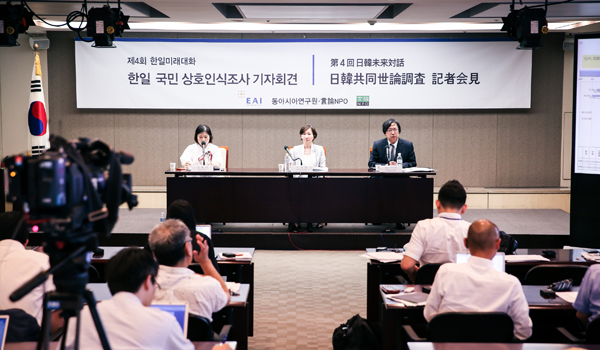
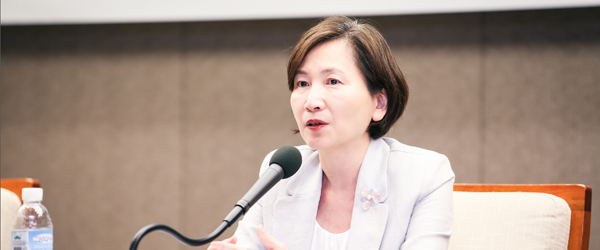
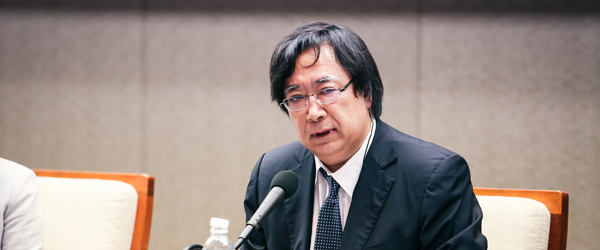
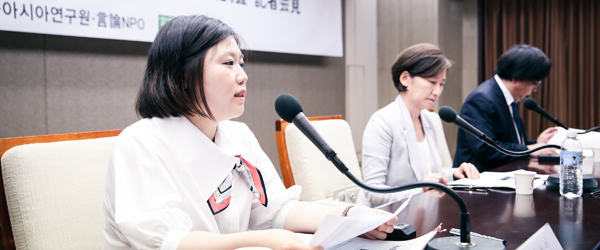
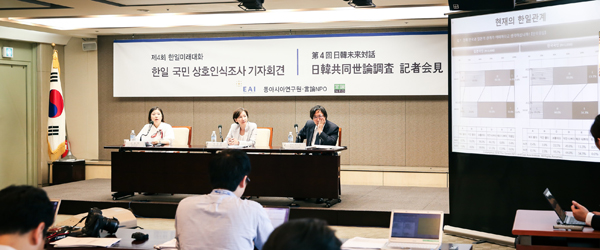
Center for Japan Studies
Redesigning Korea-Japan Relations
Korea-Japan(East Asia) Public Opinion Survey